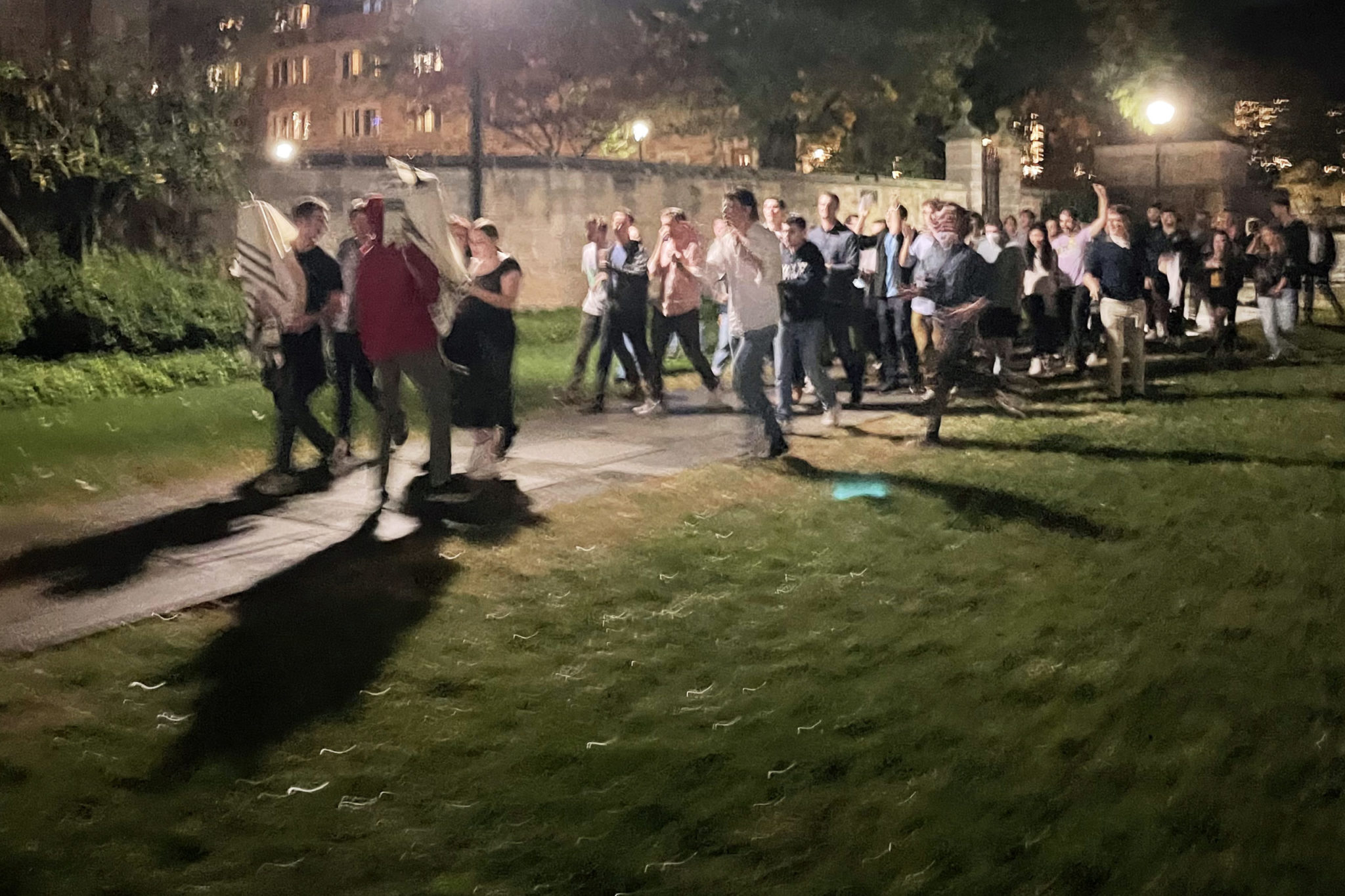Yale’s Jewish community celebrates Simchat Torah with campus “Torah Run”
From sunset on Oct. 17 to sunset the next day, Jewish students at Yale observed the holiday of Simchat Torah, with celebrations including the “Torah Run.”

Isabel Kalb, Contributing Photographer
At 8:45 p.m. on Monday, Oct. 17, over 70 of Yale’s Jewish students departed from the Slifka Center, beginning an hour-long parade around campus with singing, dancing and two plastic-wrapped Torahs.
This procession was the culmination of the holiday Simchat Torah, the last of the “high holidays” of the Jewish calendar (and the fifth in the last four weeks). The holiday centers around the Torah, the five books of Moses that are the center of Jewish religious life. Each Saturday morning of the Jewish calendar year, a single verse is read. On Simchat Torah, the final verse of Deuteronomy is read, and the first verse of Genesis is begun again.
“The idea is we just ended a year and are beginning a new one. As such, we finish the Torah, and we begin again,” said Jacob Martin ’25, president of the undergraduate board of Chabad.
The so-called “Torah Run” is a long-standing, unique Yale tradition.
Following services, dinner in the Slifka Center’s newly renovated dining hall and several rounds of singing and dancing throughout the Slifka Center building, Jewish students from all backgrounds and denominations gathered together outside the Slifka Center, bearing two Torah Scrolls wrapped protectively in plastic to keep them safe from the encroaching rain clouds.
The procession moved across campus, stopping in places including Bass Cafe, the Yale Daily News Building, Cross Campus, library walk and the Women’s Table.
At the Women’s Table, Slifka Co-President Maayan Schoen ’23 led a special dance for women in attendance, preceded by a speech of appreciation for the contributions of Jewish women to Judaism and the general community.
“With all great books, when you come back to them later, they mean something new and different, because you’ve changed as a reader, the world has changed,” said Rabbi Jason Rubenstein, the Jewish chaplain at the Slifka Center. “On Simchat Torah you remind yourself that even if you’ve been through this for more than 40 years like I have, we’re still going to find new things together this year — that’s a special joy. You never read the same torah twice.”
Yale traditions of Simchat Torah also take care to specially honor graduating seniors.
Though the Slifka Center has resident staff, the community is largely led by student efforts. Seniors are given aliyah, the honor of being called on to read from the Torah, at egalitarian services, called up for blessings during Orthodox services and form a special senior circle at the beginning of the Torah Run, outside the Slifka Center.
“Simchat Torah is about opening and closing,” said Max Bamberger ’25. “It has special value for our Yale experience of retelling the same stories through graduating classes; every four years it’s a totally different group, but traditions keep being passed down.”
The night’s festivities culminated at the Branford College gate, which bears historic significance to Yale’s Jewish community. According to campus legend, any Yale students who walk through the gate before graduation are cursed not to graduate. For Jews who cannot use electronics during Shabbat, the Branford gate, as one of the few that can be operated by a mechanical key rather than an electronic swipe, is one they must walk through each week.
On Simchat Torah, the mechanical keys are used to open the gate, and the Torah Run attendees run through together.
“It’s part of what’s wonderful and paradoxical about college Jewish communities,” Rabbi Rubenstein told the News. “In ‘Jewish time,’ a tradition that’s 500 years old is very new. But in college time, something that’s five years or older is ancient history. It’s remarkable that things like the ‘Torah Run’ have actually been passed down from one group of student leaders to another, not through the staff of Slifka, as stable traditions.”
During the pandemic, these traditions were conducted virtually. Since strictly observant Jews often do not use electronics on holidays, virtual traditions had to be moved to take place on days other than the actual holidays.
Rabbi Rubenstein recalled leading a Zoom “Torah Run,” with a virtual background of the Branford gate behind him.
In 2012, Rabbi James Ponet, Jewish Chaplain at the time, published an essay in the News on the significance of Simchat Torah.
“In an age of gradual digitalization and virtualization of the reading experience, students here and around the world will soon remember and reenact once again what it means to love a book,” he wrote.
The newly reopened Joseph Slifka Center for Jewish Life at Yale is located at 80 Wall St.







